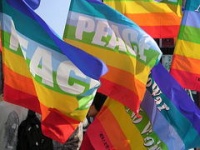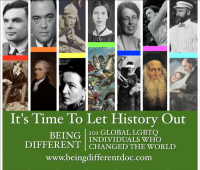Difference between revisions of "Welcome to QueerBio.com"
| (15 intermediate revisions by the same user not shown) | |||
| Line 4: | Line 4: | ||
<h2 align="center"><em>'''DID YOU KNOW?'''</em></h2> | <h2 align="center"><em>'''DID YOU KNOW?'''</em></h2> | ||
| − | <h3 align="center">''' | + | <h3 align="center">'''Peace Activists Who Identify as LGBTQ'''</h3> |
| − | [[File: | + | [[File:lgbtqpeace.jpg|200px|link=Peace Activists Who Identify as LGBTQ]] |
| − | <p> | + | <p>The LGBTQ community has long had a close affinity with peace activist movements. In part, this is due to the experience of general intolerance and bigotry directed toward LGBTQ individuals throughout history, which in turn pushes them away from conflict and organized violence as resolutions for disputes and toward understanding and compromise. In part, the LGBTQ peace movement in the United States emanated from the anti-homosexual initiatives undertaken by the McCarthy Commission as part of its communist-cleansing efforts of the 1940s, supported by individuals including [[J. Edgar Hoover]] and organizations such as the CIA.</p> |
| − | <p> | + | <p>There is some irony within the community between its push for equal rights in the military and the attraction to causes for peace. On the one hand, there are LGBTQ activists who want gay, lesbian and transgenders to be readily accepted for military duty, but there are also activists who see military conflict as morally repugnant. For many, the question is: does representation in the military matter more than lives lost through state aggression? This question is debated in the article referenced below.</p> |
| − | <p> | + | <p>A long-time peace activist group has been Lesbians and Gays Against Intervention (LGAI) which formed in the 1980s. One of their programs is called 'We Like Our Queers Out of Uniform', started in 1992. One of the issues the group addresses is the sponsorship of Pride and other community events by defense companies and other businesses involved in the military industrial complex.</p> |
| − | <p> | + | <p>Perhaps a bridge between the two opposing groups can be created by instituting an ethical focus to the debate. For example, the military is a source of technological innovation that greatly benefits many areas of society, so not all military activity is focused on aggression and violence. The issues of peace and security go beyond the narrow confines of offensive aggressive policies, and latitude could be given for the multitude of activity within the military complex.</p> |
| − | <p> | + | <p>There are institutions and organizations involved in peace activism that are attractive to the LGBTQ community as a whole. These include the Nobel Peace Prize, Human Rights Watch, Amnesty International, Journalists Without Borders, and more. There are prominent LGBTQ individuals within these organizations and programs. Lesbian American [[Jane Addams]] received the Nobel Peace Prize in 1931, and gay Irishman [[Colm O'Gorman]] is the Executive Director of Amnesty International in Ireland. |
| + | </p> | ||
| − | <p>We have identified | + | <p>We have identified prominent LGBTQ peace activists from Canada, Great Britain, Ireland, Israel, Russia, Serbia, Spain, and the United States. To read more and see the complete list, click '''[[Peace Activists Who Identify as LGBTQ|HERE]]'''</p> |
'''Directory of past 'Did You Know?' Articles''' [[Past 'Did You Know?' Articles|See Here]] | '''Directory of past 'Did You Know?' Articles''' [[Past 'Did You Know?' Articles|See Here]] | ||
| Line 37: | Line 38: | ||
== Search for a Biography == | == Search for a Biography == | ||
| − | To search for an individual from the database of over | + | To search for an individual from the database of over 16,000 biographies, simply type the name in the Search Box located in the top right hand corner of this Home Page and click on GO. Similarly, you can search for a common characteristic such as Country, City, Nobel Prize winners, writers, and so on. |
Alternatively, you can view and scroll through the entire list of biographies by viewing the [[Special:AllPages|All Biographies]] section. | Alternatively, you can view and scroll through the entire list of biographies by viewing the [[Special:AllPages|All Biographies]] section. | ||
Revision as of 19:47, 18 November 2019
DID YOU KNOW?
Peace Activists Who Identify as LGBTQ
The LGBTQ community has long had a close affinity with peace activist movements. In part, this is due to the experience of general intolerance and bigotry directed toward LGBTQ individuals throughout history, which in turn pushes them away from conflict and organized violence as resolutions for disputes and toward understanding and compromise. In part, the LGBTQ peace movement in the United States emanated from the anti-homosexual initiatives undertaken by the McCarthy Commission as part of its communist-cleansing efforts of the 1940s, supported by individuals including J. Edgar Hoover and organizations such as the CIA.
There is some irony within the community between its push for equal rights in the military and the attraction to causes for peace. On the one hand, there are LGBTQ activists who want gay, lesbian and transgenders to be readily accepted for military duty, but there are also activists who see military conflict as morally repugnant. For many, the question is: does representation in the military matter more than lives lost through state aggression? This question is debated in the article referenced below.
A long-time peace activist group has been Lesbians and Gays Against Intervention (LGAI) which formed in the 1980s. One of their programs is called 'We Like Our Queers Out of Uniform', started in 1992. One of the issues the group addresses is the sponsorship of Pride and other community events by defense companies and other businesses involved in the military industrial complex.
Perhaps a bridge between the two opposing groups can be created by instituting an ethical focus to the debate. For example, the military is a source of technological innovation that greatly benefits many areas of society, so not all military activity is focused on aggression and violence. The issues of peace and security go beyond the narrow confines of offensive aggressive policies, and latitude could be given for the multitude of activity within the military complex.
There are institutions and organizations involved in peace activism that are attractive to the LGBTQ community as a whole. These include the Nobel Peace Prize, Human Rights Watch, Amnesty International, Journalists Without Borders, and more. There are prominent LGBTQ individuals within these organizations and programs. Lesbian American Jane Addams received the Nobel Peace Prize in 1931, and gay Irishman Colm O'Gorman is the Executive Director of Amnesty International in Ireland.
We have identified prominent LGBTQ peace activists from Canada, Great Britain, Ireland, Israel, Russia, Serbia, Spain, and the United States. To read more and see the complete list, click HERE
Directory of past 'Did You Know?' Articles See Here
The goal of QueerBio.com is to be the definitive online biographical reference source for the international LGBTQ community. Its database lists over 16,000 contemporary and historical figures who identify as lesbian, gay, bisexual, transgender, queer, intersex, two-spirit, or gender fluid (LGBTQ) and includes artists, sports figures, politicians, entertainers, business leaders, academics, activists, and more. The database is widely international in scope and is an ideal source for research and analysis with full search and sort functionality.
The mission is to inspire, educate, and motivate all generations of LGBTQ individuals and others through a collective knowledge of this international community.
Managing Editors: Mark S. Bonham, Connie Bonello, Gordon Dunbar
Search for a Biography
To search for an individual from the database of over 16,000 biographies, simply type the name in the Search Box located in the top right hand corner of this Home Page and click on GO. Similarly, you can search for a common characteristic such as Country, City, Nobel Prize winners, writers, and so on.
Alternatively, you can view and scroll through the entire list of biographies by viewing the All Biographies section.
Library of Congress Historic Collection - LGBTQ+ Studies Web Archive
QueerBio.com has been chosen for the Library of Congress Web Archiving Program - Preserving important cultural artifacts by acquiring, cataloging, preserving and serving collections material of historical importance to foster education and scholarship.
Announcing Our New Documentary Project - Being Different: 101 Global LGBTQ Individuals Who Changed the World
Despite adversity and discrimination, LGBTQ individuals have excelled throughout history. Yet historians and academics have conveniently participated in the heterosexist erasure of these LGBTQ contributions by omitting the LGBTQ status of prominent historical figures from academic and historical documents. Accordingly, there are relatively few comprehensive projects which document and showcase the influence of these LGBTQ efforts.
Being Different: 101 Global LGBTQ Individuals Who Changed The World will be an original documentary outlining the contributions that members of the LGBTQ community have made, individually and collectively, to changing the world.
We are now Crowdfunding to get this project off the ground. We would love to have you as part of our team. You can help us and SUPPORT THIS PROJECT!
SEE THE TRAILER, READ MORE AND CROWDFUND HERE
Donate
Our goal is to make QueerBio.com the go-to website for global biographical information on LGBTQ identified individuals. To do this requires a serious commitment of people and resources, so we need your help to fund and help this project grow.
Click here for more information.
Sign Up for our Bi-Weekly Newsletter
Sign up to receive our informative bi-weekly newsletter. Included in the newsletter is the updated 'DID YOU KNOW?' column, a sample of new biographies added since the previous newsletter, and relevant news features pertaining to QueerBio.com.
Bonham Centre Awards Gala
Annual Awards established in 2007 to recognize individuals or groups that have made a significant contribution to the advancement and education of human rights issues surrounding sexual education. Click here to find out more about the Bonham Centre Awards, past recipients, and present nominees.
Books Available From QueerBio.Com
A Path to Diversity: LGBTQ Participation in the Working World (Mark S. Bonham, 2017) investigates the current state of employment markets around the world for the LGBTQ community. Included is a discussion of equality in the workplace and why it is important to both the employer and employee, the wage gap, which professions are attractive to LGBTQ individuals and why, and the role of unions and government legislation. A survey of seventy five professions provides a status report for each, and seventy two biographies of influential LGBTQ professionals from around the world is included. 242 pages
Notables: 101 Global LBGTQ People Who Changed the World (Mark S. Bonham, 2015) reveals a group of select global Lesbian, Gay, Bisexual, Transgender, and Queer (LGBTQ) individuals whose accomplishments in their profession changed the world in some relevant way. Included are founders of various social movements, innovators in sports, leaders in business and politics, explorers and discoverers, instigators in religious movements, thinkers in philosophy, infamous villains, creators of new academic fields of study, and risk takers in the arts, culture, and entertainment worlds. 212 pages.
Champions: Biographies of Global LGBTQ Pioneers (Mark S. Bonham, 2014) reveals a group of select artists, writers, politicians, lawyers, sports figures, activists, and religious figures from around the world who have helped shape the history of the LGBTQ community. Presented in a convenient notebook format. 114 pages.
READ MORE AND PURCHASE PRINT or EBOOK COPIES HERE
Order for yourself, and the books also make an ideal gift for friends and family while supporting the development of QueerBio.Com



